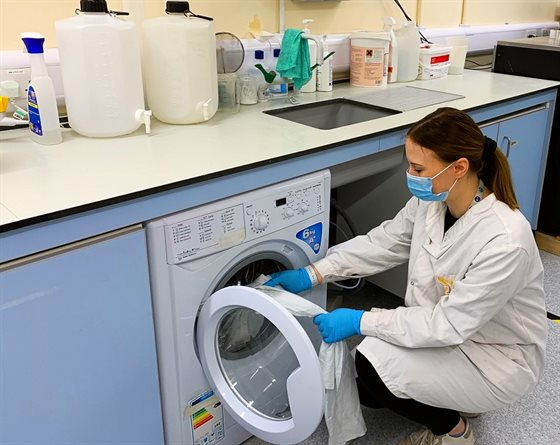Study Shows That SARS-CoV-2 Coronavirus Can Remain Infectious For Up To Three Days On Clothes And Masks!
Source: SARS-CoV-2 Coronavirus Feb 25, 2021 4 years, 11 months, 3 weeks, 1 day, 7 hours, 30 minutes ago
A new research carried out by scientists from De Montfort University (DMU) in Leicester-UK has discovered that the SARS-CoV-2 coronavirus can linger in its infectious state for as long as three days on clothes and even cloth masks.
https://www.dmu.ac.uk/about-dmu/news/2021/february/research-shows-coronavirus-can-survive-on-healthcare-uniforms-for-three-days.aspx
 Dr Laird Working On Her Study Credit: DMU
Dr Laird Working On Her Study Credit: DMU
The study team led by led by microbiologist Dr Katie Laird, virologist Dr Maitreyi Shivkumar and postdoctoral researcher Dr Lucy Owen analyzed how the coronavirus behaves on three fabrics commonly used in the healthcare industry.
The research showed that not only can masks carry the virus, but there is also concern for the uniforms worn by health care workers.
They tested a virus similar to the
SARS-CoV-2 coronavirus on polyester, a cotton-polyester blend and 100% cotton fabric.
The study findings showed that polyester posed the highest risk. After three days, the virus was still present on the fabric and could be transferred to other surfaces, the research showed. On the blend of polyester and cotton, the virus survived for six hours. But on fabric that was 100 percent cotton, the virus endured for 24 hours.
The study involved adding droplets of a model coronavirus called HCoV-OC43 which has a very similar structure and survival pattern to that of Sars-CoV-2 which causes COVID-19, to polyester, polycotton and 100% cotton.
Dr Laird advised the British health authorities via the university that all healthcare uniforms should be laundered in hospitals to commercial standards or by an industrial laundry.
Dr Katie Laird who is also head of the Infectious Disease Research Group at DMU told Thailand Medical News, "When the pandemic first started there was very little understanding of how long coronavirus could survive on textiles. Our study findings show that three of the most commonly used textiles in healthcare pose a risk for transmission of the virus. If nurses and healthcare workers take their uniforms home, they could be leaving traces of the virus on other surfaces."
The research also looked at whether washing machines eliminated the virus, and found that the virus cannot survive when the wash water is heated to at least 67 degrees Celsius, which is about 153 degrees on the Fahrenheit scale.
Using 100% cotton, the most commonly used healthcare textile, the scientists conducted a number of tests using different water temperatures and wash methods, including domestic washing machines, industrial washing machines, on-premise hospital washing machines, and an ozone (a highly reactive gas) wash system.
The study results showed that the agitation and dilution effect of the water in all of th
e washing machines tested was enough to remove the virus.
But when the study team soiled the textiles with artificial saliva containing the virus (to mimic the risk of spread from an infected person’s mouth), they found that domestic washing machines did not fully remove the virus and some traces survived.
Importantly it was only when they added a detergent and increased the water temperature that the virus was completely eliminated. Investigating the tolerance of the virus to heat alone, findings showed that coronavirus was stable in water up to 60°C, but was inactivated at 67°C.
The study team next looked at the risk of cross contamination, placing clean items of clothing in the same wash as those with traces of the virus. They found all wash systems removed the virus and there was no risk of the other items being contaminated.
Dr Laird noted her research found that current British guidelines would not eliminate transmission because they do not call for hot enough water when washing fabric.
Dr Laird continued: "Once we had determined the survival rate of coronavirus on each of the textiles, we turned our attention to identifying the most reliable wash method for removing the virus.”
She added, "While we can see from the research that washing these materials at a high temperature, even in a domestic washing machine, does remove the virus, it does not eliminate the risk of the contaminated clothing leaving traces of coronavirus on other surfaces in the home or car before they are washed. We now know that the virus can survive for up to 72 hours on some textiles and that it can transfer to other surfaces too.”
She stressed, "This study findings has reinforced my recommendation that all healthcare uniforms should be washed on site at hospitals or at an industrial laundry. These wash methods are regulated and nurses and healthcare workers do not have to worry about potentially taking the virus home."
For more about the
SARS-CoV-2 Coronavirus, keep on logging to Thailand Medical News.
